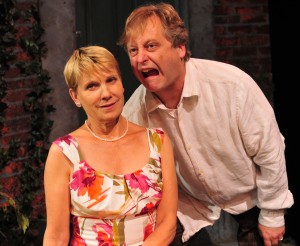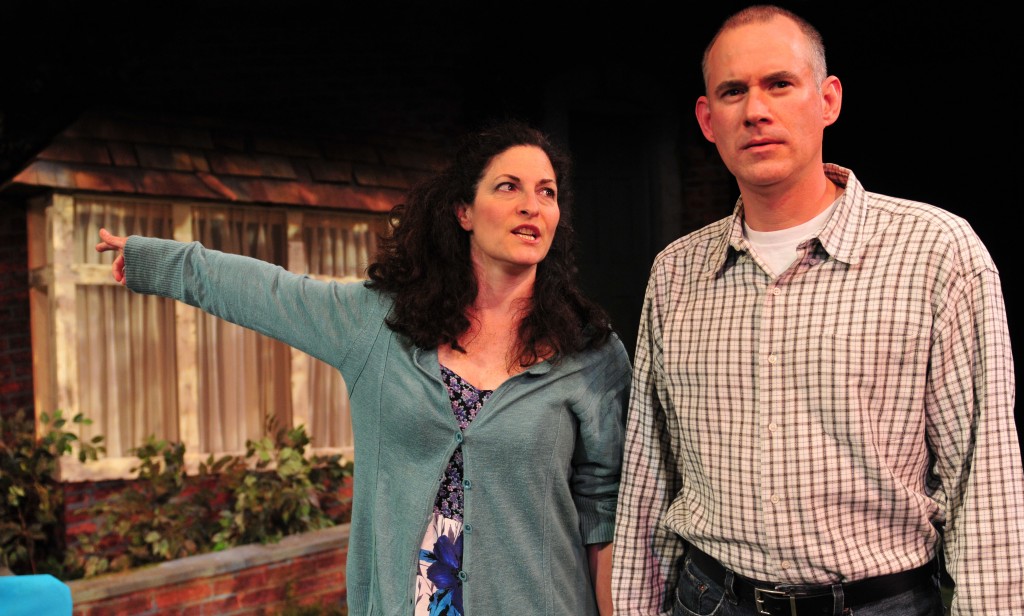Theater Review: A Delightful Turn “Round and Round the Garden”
British playwright Alan Ayckbourn does not build gag machines that spit out one-liners. He creates finely etched characters whose humor is rooted in their befuddled behavior and personalities.
Round and Round the Garden by Alan Ayckbourn. Directed by Eric C. Engel. Staged by Gloucester Stage Company, Gloucester, MA, through July 1.
By Iris Fanger

Lindsay Crouse (Sarah) and Steve Barkhimer (Norman) in the GSC’s production of ROUND AND ROUND THE GARDEN. Photo: Gary Ng.
The estimable, English playwright, Alan Ayckbourn, author of some 75 plays, writes about ordinary men and women, building his popular comedies around his characters’ fears, tics, and fantasies. Unlike Neil Simon, to whom he is often compared because of the farcical parlor/ bedroom aspect of some of his works, Ayckbourn does not build gag machines that spit out one-liners. He creates finely etched figures of fun whose behavior is rooted in their befuddled personalities.
Over the past few years, the Gloucester Stage Company has been producing Ayckbourn’s The Norman Conquests Trilogy, doing one play at a time. Round and Round the Garden is the final play in the series: Table Manners was seen in 2010, Living Together in 2011. The plays take place on the same weekend, the comic action set in the dining room for the first script, the family living room in the next, and outdoors for Round and Round the Garden. Some theater companies, to emphasize Ayckbourn’s theatrical ingenuity, have staged the plays together, allowing audiences to see the trilogy in one day.
But that’s not to suggest that there is a drawback with seeing them one at a time, given the playwright’s skill at tucking in enough exposition to let new viewers in on the daffy doings. The three siblings and their mates (or wished-for partner in one case) have come together to give the younger sister, the spinster Annie, a respite from caring for their mother. However, Annie has plans for a holiday with her older sister Ruth’s husband, Norman, who has invited her for a “dirty weekend” with little scenery besides the wallpaper in the hotel room he has reserved. The secret getaway is quickly broadcast when the caustic Sarah (the wife of Norman’s brother, Reg), finds out and telephones Ruth. “I thought you should know,” she tells her with barely disguised malice.
Norman, a self-styled Lothario with no conception of the havoc he wreaks on other lives, stands, leaps, and topples to the ground in a drunken fit, generally cavorting through the stage space as if he were a clown on leave from the Big Apple Circus. An assistant librarian, he’s a British version of Walter Mitty, only he acts out his lusts rather than just dreaming about them. The others enable his antics, particularly Ruth, who excuses him as a pet-like creature who is amusing to keep around the house.
Steven Barkhimer’s Norman is as endearing as he is mischievous: the character comes off as a klutz of a guy who is none the less a charmer. Barkhimer’s performance is the star turn in a cast filled with other terrific actors: Lindsay Crouse as the unhappy Sarah, Richard Snee as good old Reg, a man who doesn’t mind washing up the dishes, and Adrianne Krstanksy as Ruth, the pragmatic wife, who is suppressing a randy subtext of her own. Rounding out the first-rate crew are Barlow Adamson as the clueless Tom, who hides his desires behind a nerd-like persona, and Sarah Newhouse as the frumpy Annie, a fey-like woman who might have strayed in from one of Andrew Lang’s Fairy Books.
Ruth arrives at the start of Act II to complicate the affair. The other odd character, and you can read that any way you chose, is Tom, the local vet who has been faux-courting Annie for years. He hangs around, frequently arriving artlessly just in time for dinner. He seems to love her, but he cannot get the romantic words out of his mouth. However, before you cast Annie as the weekend’s victim, you have to look carefully at her equivocal sense of self-worth.
Lest the collective frustrations remind you of Chekhov, be assured that there is much more comedy here than tragedy. At the climax, Norman and Annie are rutting together in the flower bed while the others look on in dismay. A scene Chekhov never imagined. There are funny lines galore, inspiring a crescendo of hilarious physical business by the actors on stage, carefully nudged into high glee by director Eric C. Engel.
One suspects that Engel wanted the American cast to sport English accents, an aim that is successful in varying degrees. He had no need to worry that we’d miss the British inflections of the ensemble. Ayckbourn is very funny, performed with or without the proper accent.
Tagged: Alan Ayckbourn, Eric C Engel, Gloucester Stage Company, GSC, Round and Round the Garden


I run a fan site for Ms. Crouse on Facebook. All fans or students of hers are welcome to join us.
https://www.facebook.com/home.php?sk=group_114377611984063&ap=1